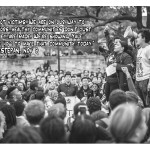I have struggled for nearly three years with Wallace Stevens’ “Sunday Morning.” Since having sex with another man for the first time last weekend, it’s felt yet more pressing to understand this poem. Ostensibly, there is no connection between sex and Stevens’ poem about losing faith. Perhaps a more fitting poem to commemorate the loss of my virginity would be Allen Ginsberg, with his “Footnote to Howl.”
The world is holy! The soul is holy! The skin is holy! The nose is holy! The tongue and cock and hand and asshole holy!
Certainly this poem is more in line with my experience of slightly buzzed, astigmatic (I threw my glasses into the hamper and his onto the floor) sex: imagine soft focus on each body part–contextless. Each body part is intended to be a vehicle for delight, orgiastically divine in nature, as love and pleasure are holy. I do not remember his face; he did not tell me his name. The only words we exchanged were a confirmation that neither of us had a condom. He was not much more, otherwise, than a boy who had messaged me on Grindr at 3:35 in the morning, after I had dragged my friends back to our dorm from LEO (formerly known as SAE). I saw Him as skin, as nose, as tongue on my tongue and a cock in my hand. I do remember he had nice shoes. But what does this experience, a mild mistake-but-not-really, mean about God?
Complacencies of the peignoir, and late
Coffee and oranges in a sunny chair,
And the green freedom of a cockatoo
Upon a rug mingle to dissipate
The holy hush of ancient sacrifice.
She dreams a little, and she feels the dark
Encroachment of that old catastrophe,
As a calm darkens among water-lights.
I wonder if I relate to the anonymous She of the poem–why my own attempt to understand Her feels like a veiled attempt to understand the events of last weekend. If the woman awakes on a Sunday morning, remaining in her peignoir and drinking late coffee while her family has dressed in their best to go to church, I wonder if I have done the same. I struggle to remember. I, too, woke late on Sunday morning. I was dressed not in a peignoir, but in clothes that stank of Him. I took my sheets to the laundry room (and my towel, too, since it reeked of stale cum). I returned to my room, steeping stolen Tazo tea in a mug I have never washed.
I do not know if any literary analyst has seen the Stevens poem and thought of sex–or more particularly, the morning after some adulterous affair. If She has sinned in the night, then the coffee and oranges and sunny chair serve as some beautiful and horrifying counterpoint. They remind, by their incongruity with the night before, of the stink of the mistakes.
Let me be clear: I do not identify my sexuality as sinful. Rather, I remember His smell, a hint of soap that has soured in the twenty hours since his last shower. I remember the smell of my towel the morning after–and I remember the smell of laundry detergent when my sheets came out of the dryer. I am discomfited by the circumstances: by the fact that I do not know his name, that what we had was hardly even what it attempted to be (a relief of the libido). What is, then, the “dark encroachment of that old catastrophe?” Can it be anything else, but the catastrophic confusion I feel?
What is divinity if it can come
Only in silent shadows and in dreams?
I try to divorce myself from the patriarchal funneling of all my libidinal desires into one partner (the couple form), but I find myself still shaken. I like to think of these lines as an slate-object for projecting my confusion.
What is (divinity/love/sex/libidinus/desire/validation) if it can come
Only in silent (shadows/men/cumshots) and in (dreams/dick pics/anonymous Grindr messages)?
I eliminate each possibility, sensing some fundamental incongruity between what I mean and what I can possibly say. At the same time, I can recognize, at my close distance, that no option is wrong, but merely incomplete. I recognize that Madlibs isn’t the answer.
In statistics, we discuss tree diagrams, a way of mapping out the finite possibilities that result from chance events–or choices. Considering chance and choice in an indentical fashion implies that choices are random. Perhaps that’s not far from the truth: when it comes to my Grindr grid, hookups sometimes feel that way. The question of who will message me–and who I will message back–depends on vicissitudes: particularities of the season, of my hormone levels, of the events that have transpired the night before. In that sense, it is a matter of chance if I should hookup with anyone at all.
“Hookup”, defined: have sex with, in a meaningless, desultory way.
Shall our blood fail? Or shall it come to be
The blood of paradise? And shall the earth
Seem all of paradise that we shall know?
The sky will be much friendlier then than now,
A part of labor and a part of pain,
And next in glory to enduring love,
Not this dividing and indifferent blue.
If sex is paradisiacal–we so often compare the height of delight to orgasm–then Earth, with its messiness, its opacity, and its disappointment, is all of paradise that I have known. The sky looks no friendlier, though I recognize my own labor in the production of pain.
I have penned this essay as a way of anatomizing my experience–of analyzing sex and reducing it to the utilitarian unit: the util (the pleasure derived), and its implicit antagonist, pain. I have drawn on all my modes of analysis: literary, psychological, statistical–and yet, the experience has remained as opaque as ever: a mirror, showing me myself, on the surface of a piece of glass whose transparency has been transformed by silver backing.


